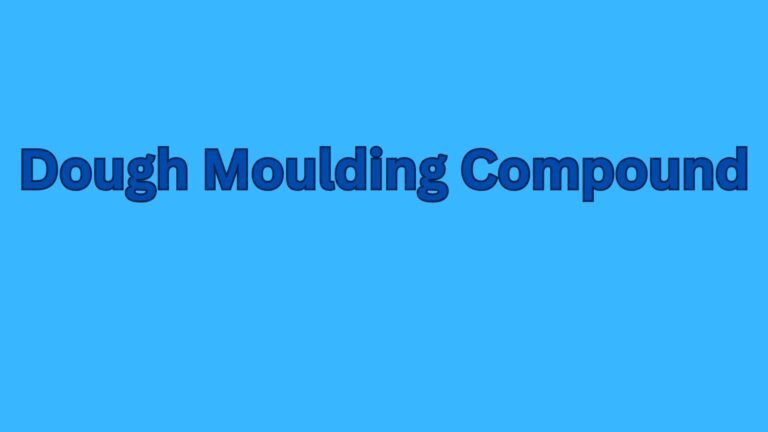Dough moulding compound (DMC) is a versatile and robust material widely used in various industries, including construction, automotive, and consumer goods. This guide will delve into the benefits, uses, and tips for working with DMC, equipping you with essential knowledge to make the most of this remarkable material.
What is Dough Moulding Compound?
Dough moulding compound is a thermosetting polymer composite, primarily composed of unsaturated polyester resin, fillers, and various additives. The term “dough” refers to its malleable, paste-like consistency when mixed. Once cured, DMC transforms into a hard, durable material that can withstand harsh conditions, making it ideal for various applications.
Benefits of Dough Moulding Compound
Durability and Strength
One of the most significant advantages of DMC is its exceptional durability. Once cured, DMC exhibits high tensile strength and impact resistance, making it suitable for products that require longevity and toughness. This makes it a preferred choice for automotive parts and construction materials.
Resistance to Environmental Factors
DMC is resistant to moisture, chemicals, and temperature fluctuations. This characteristic makes it an excellent choice for outdoor applications and environments where exposure to harsh conditions is expected. For example, it is often used in electrical enclosures and exterior components.
Versatility
Dough moulding compound can be molded into various shapes and sizes, allowing for customization to meet specific requirements. This versatility enables its use in diverse industries, from creating intricate designs in consumer products to manufacturing robust industrial components.
Cost-Effective
Compared to other materials like metals or ceramics, DMC is often more cost-effective. Its ability to be produced in large quantities reduces manufacturing costs, making it an attractive option for businesses looking to maintain quality while minimizing expenses.
Eco-Friendly Options
Many manufacturers are now producing eco-friendly DMC formulations. These compounds utilize recycled materials and environmentally safe resins, making them a sustainable choice for businesses looking to reduce their carbon footprint.
Common Uses of Dough Moulding Compound
Automotive Industry
In the automotive sector, DMC is used to manufacture various components, such as panels, housings, and electrical parts. Its lightweight yet strong nature contributes to fuel efficiency without compromising safety.
Electrical and Electronics
DMC is frequently used in electrical enclosures and components due to its excellent insulating properties and resistance to moisture. This ensures the reliability of electrical devices and protects them from environmental damage.
Consumer Goods
Many everyday products, from kitchen appliances to furniture, incorporate DMC. Its ability to be molded into intricate shapes allows designers to create appealing and functional products that meet consumer needs.
Construction
In construction, DMC is utilized for making architectural elements, fixtures, and fittings. Its durability and resistance to environmental factors make it ideal for both interior and exterior applications.
Marine Applications
Dough moulding compounds are used in marine environments for their resistance to corrosion and water. Components such as boat fittings, housings, and decorative elements benefit from DMC’s robust characteristics.
Tips for Working with Dough Moulding Compound
Proper Mixing
To achieve optimal results, it is essential to mix DMC thoroughly according to the manufacturer’s specifications. This ensures uniformity in the material and prevents issues during the curing process.
Temperature Control
Maintaining the right temperature during the curing process is crucial. Too high or too low temperatures can affect the curing time and the final properties of the DMC product. Ensure that the environment is controlled for best results.
Molding Techniques
Utilize appropriate molding techniques to achieve the desired shape and finish. Compression molding and injection molding are common methods that can be employed depending on the complexity and volume of the production.
Post-Curing Process
After the initial curing, some applications may benefit from a post-curing process to enhance the mechanical properties of DMC. Follow the manufacturer’s guidelines for the best outcomes.
Safety Precautions
When working with DMC, always wear appropriate protective gear, including gloves, goggles, and masks. Ensure adequate ventilation in the workspace, as the curing process can release fumes that may be harmful.
Conclusion
Dough moulding compound is a highly versatile material with numerous benefits that make it suitable for a wide range of applications. From its durability and resistance to environmental factors to its cost-effectiveness and eco-friendly options, DMC stands out as an ideal choice for industries like automotive, electrical, consumer goods, and construction. By understanding its uses and following best practices for working with DMC, you can maximize the potential of this remarkable compound.
ALSO READ:Astromelias: The Vibrant Flower For Every Garden
FAQs
What is the main component of dough moulding compound?
The primary component of dough moulding compound is unsaturated polyester resin, along with fillers and additives that enhance its properties.
How does DMC compare to other materials?
DMC is often lighter and more cost-effective than metals and ceramics while offering similar strength and durability. It also has superior resistance to moisture and chemicals.
Can DMC be recycled?
Many manufacturers now produce eco-friendly DMC formulations that incorporate recycled materials. However, traditional DMC is not easily recyclable due to its thermosetting nature.
What safety precautions should I take when using DMC?
Always wear gloves, goggles, and masks when handling DMC. Ensure your workspace is well-ventilated to avoid exposure to fumes released during the curing process.
What industries commonly use dough moulding compound?
DMC is commonly used in the automotive, electrical, consumer goods, construction, and marine industries due to its versatility and durability.

